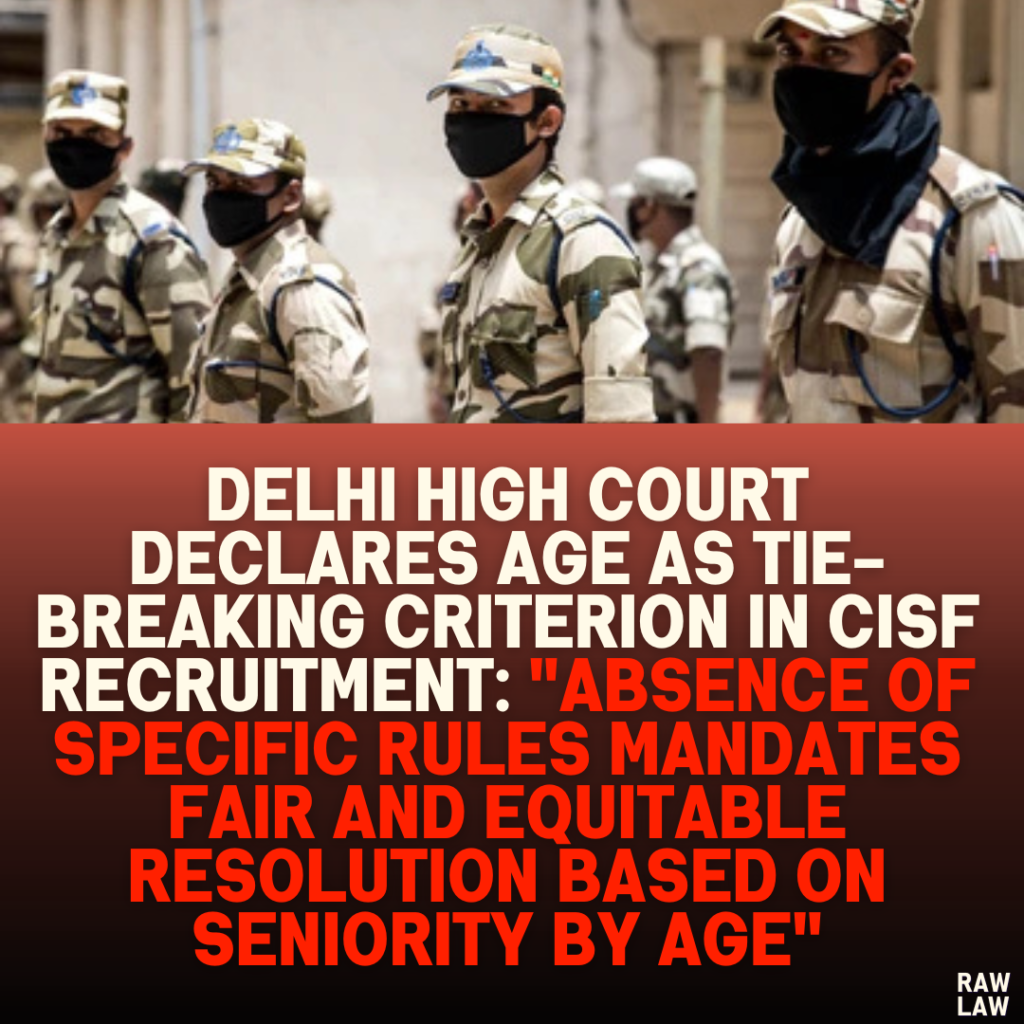1. Court’s Decision
The Delhi High Court decided that, in the absence of a specific tie-breaking formula in the examination notification, age must be used as the determining factor to resolve ties in marks. The Court held that:
- The petitioner, being older, deserved to be selected over the last recommended candidate.
- The petitioner should be granted retrospective seniority above the last selected candidate.
- The last candidate’s appointment will not be disturbed.
- No monetary benefits (pay or allowances) are granted for the period during which the petitioner was not employed in the promoted role.
2. Facts of the Case
The petitioner, a Sub-Inspector in the CISF, applied for the post of Assistant Commandant through the LDCE-2019. The recruitment process involved:
- Written Examination:
- Paper-I: Objective type, 300 marks.
- Paper-II: Subjective, 100 marks.
- Physical Endurance and Medical Tests.
- Interview/Personality Test: 200 marks.
The petitioner and the last recommended candidate both scored identical total marks (369/600). However, differences arose in the component scores:
- Paper-II Marks: Petitioner: 39, Last Candidate: 43.
- Interview Marks: Petitioner: 132, Last Candidate: 128.
The petitioner was denied selection, as the UPSC resolved the tie by giving preference to Paper-II marks, following its standard formula:
- Higher total written marks.
- Higher marks in Paper-I.
- Seniority by age (if earlier criteria fail).
The petitioner challenged this formula, arguing that age should have been the deciding factor due to the absence of a tie-breaking rule in the recruitment notification.
3. Issues
The primary legal questions were:
- Whether age should have been the determining factor in resolving the tie in marks.
- Whether the UPSC’s standard tie-breaking formula could be applied in the absence of a specific notification provision.
4. Petitioner’s Arguments
The petitioner argued:
- The recruitment notification did not prescribe any tie-breaking formula, creating ambiguity.
- In similar cases (Amresh Shukla v. Directorate General, CISF & Anr.), the Court had decided that age should be used to resolve ties.
- The UPSC acted as an “agent” of the CISF and had limited authority to apply its own tie-breaking formula.
- Given his seniority by age, the petitioner should have been selected.
5. Respondent’s Arguments
The respondents (UPSC and CISF) contended:
- The UPSC consistently applies a tie-breaking formula giving preference to marks in specific components (e.g., Paper-II) before considering age.
- The precedent in Amresh Shukla was flawed as it undermined the constitutional role of the UPSC, which operates under Articles 315 and 320 of the Constitution.
- The petitioner’s interpretation of the rules could disrupt the standardized recruitment process.
6. Analysis of the Law
The Court analyzed:
- Ambiguity in the Notification:
- The recruitment notification did not explicitly state how ties should be resolved, leaving room for interpretation.
- Precedent:
- In Amresh Shukla, the Court had ruled that age should be the tie-breaking factor in similar recruitment processes for the same post.
- The Supreme Court had dismissed the challenge to this judgment, solidifying its authority.
- Role of UPSC:
- While the UPSC has a constitutional role in conducting examinations, it cannot override rules established for specific recruitments by the appointing authority (CISF in this case).
- Fairness:
- Resolving ties based on age aligns with service jurisprudence, ensuring equitable outcomes for candidates.
7. Precedent Analysis
The Court extensively referred to Amresh Shukla, where:
- The absence of a tie-breaking formula led the Court to prioritize seniority by age.
- It emphasized that service rules should promote fairness and avoid fortuitous outcomes.
- The principle of prioritizing age was consistent with past practices and broader principles of equity in service law.
8. Court’s Reasoning
The Court reasoned:
- The petitioner’s argument was valid, as the recruitment notification lacked a specific tie-breaking rule.
- Age is a fair and logical criterion for resolving ties, as it avoids arbitrary outcomes and reflects seniority.
- The UPSC’s formula, while consistent with its practices, could not override the Court’s earlier precedent or the equitable principles underpinning service rules.
9. Conclusion
The Court ruled:
- The petitioner must be declared selected for the post of Assistant Commandant.
- The petitioner’s appointment should include retrospective seniority above the last selected candidate but exclude pay or allowances for the intervening period.
- The appointment of the last selected candidate will remain unaffected.
10. Implications
This judgment underscores:
- The need for clarity in recruitment notifications, particularly regarding tie-breaking rules.
- The precedence of fairness and equity in service law, favoring age as a tie-breaking criterion in the absence of explicit rules.
- The limits of the UPSC’s authority when acting on behalf of other appointing authorities.
